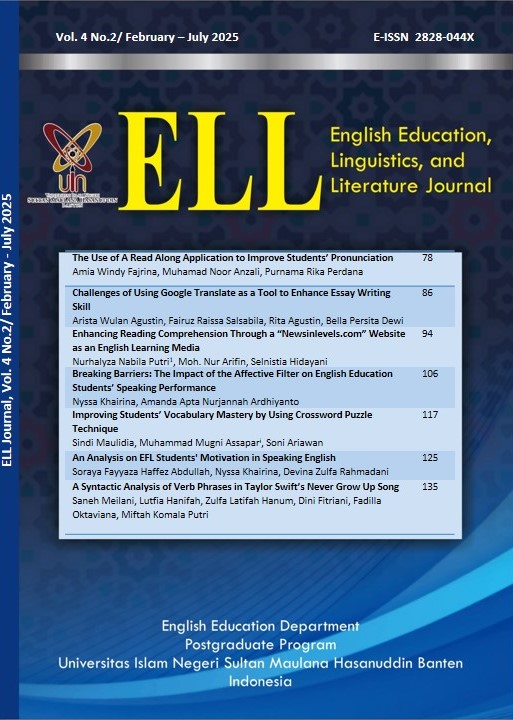Breaking Barriers: The Impact of the Affective Filter on English Education Students Speaking Performance in Class
DOI:
https://doi.org/10.32678/ell.v4i2.11682Keywords:
affective filters, self-confidence, motivation, anxiety, speakingAbstract
This research aims to analyze the influence of affective filters, Krashen’s theory, on students’ speaking performance through the three affective filters: self-confidence, motivation, and anxiety. A qualitative study was used to understand how affective filters influence students’ speaking performance. To collect the data, the researchers used questionnaires distributed to 10 participants of English Education students. The result shows that self-confidence becomes the main factor that makes their speaking ability low. Anxiety can also make it even worse. However, most students are highly motivated to learn English, mainly when speaking English. Therefore, teachers should provide a supportive learning environment to help the students reduce anxiety and enhance self-confidence.
Downloads
References
Andriani, R., Sumardi, M.S., & Pratama, A. (2024). Factors affecting students’ English speaking performance in classroom participation. Jurnal Penelitian, Pendidikan, dan Pengajaran (JPPP), 5 (2), 208-2012. 10.30596/jppp.v5i2.20470
Bhanu, S., & Selvaraj, V. (2023). The role of affective filters in ESL classrooms: Fostering effective learning environments. Humanities and Social Science Studies, 12(2), 25-32.
Creswell, J.W. (2013). Research design: qualitative, quantitative, and mixed method
approaches. London: SAGE Publications, Inc.
Gardner, R. C. (1985). Social psychology and second language learning: The role of attitudes and motivation. Edward Arnold, 205. https://doi.org/10.1037/h0083787
Horwitz, E. K., Horwitz, M. B., & Cope, J. (1986). Foreign language classroom anxiety. The Modern language journal, 70(2), 125-132. https://doi.org/10.2307/327317
Khouni, O., Gasim, A., Al Fahdi, S., & Al Naabi, E. (2022). Factors Causing Learners' Anxiety in FL Speaking: The Case of GFP Learners at UTAS, Nizwa, Oman. English Language Teaching. https://doi.org/10.5539/elt.v15n10p108
Kiruthiga, E., & Christopher, G. (2022). The impact of affective factors in English speaking skills. Theory and Practice in Language Studies, 12(12), 2478-2485. https://doi.org/10.17507/tpls.1212.02
Krashen, S. (1982). Principles and practice in second language acquisition. New York: Pergamon Press Inc.
Lemana II, H., Casamorin, D., Aguilar, A., Paladin, L., Laureano, J., & Frediles, J. (2023). Affective Filters’ Extent of Influence on Oral Communication: L2 Learners’ Perceptions. International Journal of Educational Management and Development Studies, 4(1), 88-108. https://doi.org/10.53378/352969
Downloads
Published
Issue
Section
License
Copyright (c) 2025 Nyssa Khairina, Amanda

This work is licensed under a Creative Commons Attribution-ShareAlike 4.0 International License.






